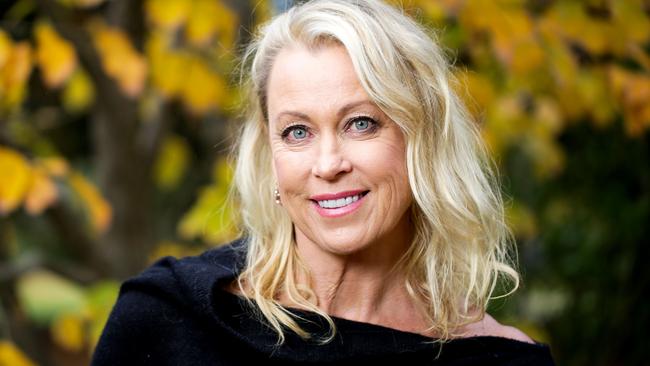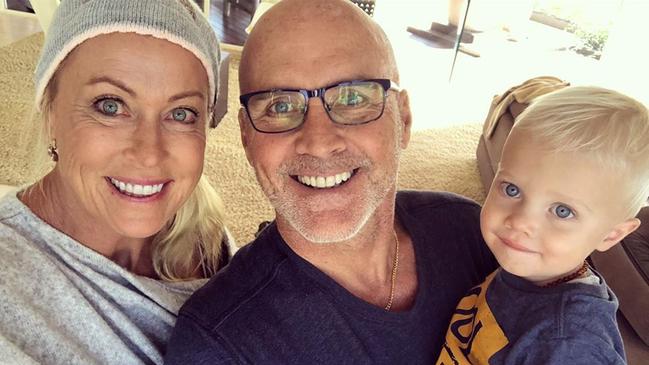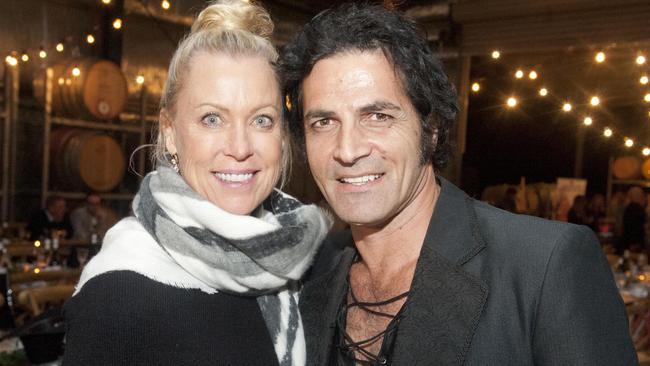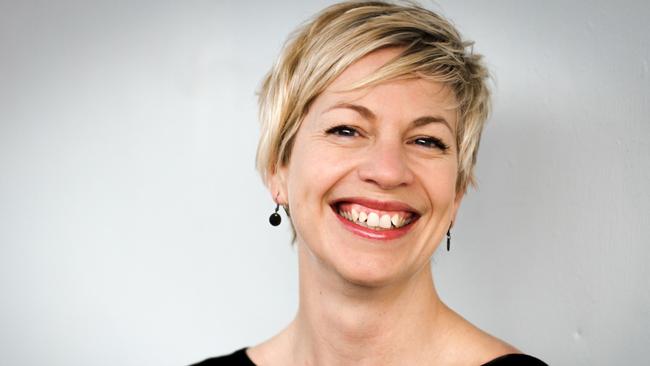Olympian Lisa Curry on why menopause and its debilitating effects shouldn’t be secret ladies’ business
Lisa Curry admits her hormonal hell contributed to the demise of her marriage to ironman Grant Kenny. But now she knows she wasn’t just “a miserable cow” like she once thought and doesn’t understand why women won’t talk about their struggles with menopause.
News
Don't miss out on the headlines from News . Followed categories will be added to My News.
Knowledge, prevention and even preparation could have changed the course of Lisa Curry’s life.
Now that she is happy and relatively calm, the turmoil that characterised much of her adult life seems all the more pronounced, especially when realising it was caused by hormonal imbalance.
“I still have a lot of personal stress, as we all do, that pulls at me daily but I’m so much more calm now and feel a lotbetter about myself,” Curry says.
“I had horrific hormonal imbalance when I had my kids but I didn’t know what it was. I just thought I was a miserable cow. I didn’t see the patterns but now I know, and I also know that it contributed quite a bit to our marriage breakdown (with the father of her children, Grant Kenny).

“Now that we’re all aware of it, everyone understands but I can see that being informed and educated by the right people iscrucial. Preparation and prevention is everything.”
She can look back on the time after the birth of her children Jaimi Lee, 32, Morgan, 28, and Jett, 24, and the uncontrollable hormonal mood swings she suffered that put a great strain on her and the family. Acknowledging that ex-husband Kenny sufferedduring their 26-year marriage, which ended in 2009, makes her just as keen to help advise men through the turbulence of women’shormonal issues.
“I had some typical premenstrual stress where my moods would be up and down but it wasn’t until after giving birth that mymoods were really bad,” Curry says.
“I managed as best I could but I believe I was perimenopausal (the transition stage to menopause). I didn’t know then thatI had it.
“People don’t even talk about menopause very much but they talk even less about perimenopause.

“Some of the symptomsare very similar to anxiety and depression so it can be difficult to diagnose, but I had pushed myself physically to the limitevery single day of my life from the age of 10 to 33.
“I was at my first Olympics when I was 18 and my last was when I was 30 so my body was never in that homeostasis that is soimportant for your hormones to function properly.
“Anything that is extreme gets your body out of balance and mine was right out of balance.”
Curry, now 57, admits she was clueless about proper nutrition until she was in her 30s because her rigorous Olympic swimming training meant she quickly burnt off whatever she ate.
Once she developed a heart problem, known as myocarditis, and had a defibrillator implanted surgically in 2008, her approach to nutrition changed.
When combined with the Happy Hormone supplements, plant-based herbs and fermented superfoods addressing a range of women’shealth issues, developed by her business partner and naturopath Jeff Butterworth, her hormone levels started to level out.
They met in 1996 and Curry believes he has changed her life.

That wasn’t enough though as she set out on the long road to educate other women, men and particularly teenage girls about the power of their own hormones. There are more than 200,000 people on her Facebook page where much of her role is in teachingpeople about hormones, helped by a large team of experts.
The starting point is to spread the message that menopause is normal.
“It’s just a natural process,” she says.
“It’s something that our parents didn’t particularly talk about. They seemed to sail on through it or took HRT (hormone replacementtherapy) and it wasn’t really spoken about. Now there’s so much information and so many ways to help yourself, always realising that it’s just a natural progression that your body goes through.”
Much of her focus is on teenagers because she knows that early education could have saved her and Kenny so much anguish.
She is now happily married to entertainer Mark Tabone, and her emotions are much more balanced, even though she has begun to experience some symptoms of menopause such as hot flushes.
But she wants to help teenagers get more in touch with their bodies.

She has big plans under way for her property on the Sunshine Coast hinterland, including health and wellness retreats.
“No one is interested in PMS when you’re 18 because that’s for old people,” Curry says.
“When I talk to people about this, regardless of their age, I ask them what sort of person they want to be when they’re 40, 60, 70 or 80.
“Do they want to be in a walking frame or running around with their grandkids? The choice is theirs but you have to think about bout it as early as possible.
“They follow these so-called influencers and compare themselves but it’s just not reality. Honestly, feeling happy, healthy and on top of the world means everything. We talk about the medals I’ve won but they’re nothing compared to helping people change their lives.”

KARINA GRIFT IS A MELBOURNE ARTIST AND WRITER. THIS IS HER EXPERIENCE ON THE HORMONE MERRY-GO-ROUND THAT’S MENOPAUSE
My rage is disproportionate to the offence. My teenage son forgot to empty the dishwasher before he left for school.
I am seething. I feel like hurling every dish across the room.
This is what I’m like now. My rage goes from zero to 100 in seconds over the slightest trigger.
Some days I feel like it’s controlling me. On these days I hate the words I hear myself screaming at the kids, about how lazy they are, how selfish, how no one helps.
During these times I want to leave, or I want them to leave and take their mess with them.
I know many parents can relate to this. But this is different.
I have never been like this before. Not during the toddler tantrums, not in the midst of grief, not when overworked or sleep-deprived.
I have been angry, of course, but this rage, it scares me.
Then there are days I struggle to concentrate. I read and re-read emails and none of it sinks in. It’s like I can’t hold onto a thought long enough to do something meaningful with it. I am forgetful.
I forget why I walked into a room or where I putsomething, I can’t remember words, I can’t remember names. It doesn’t happen a few times, it happens a lot and then my rageturns against myself.
Other days I don’t want to get out of bed. When the house is quiet and I’m alone, I cry but if someone asked me why I wouldn’tbe able to tell them.
Fatigue drains me. I haven’t felt this tired since pregnancy. I could be fine then suddenly feel as though my legs are wadingthrough mud.
Hot flashes feel like an internal furnace in my chest that have me stripping layers off one moment, then shivering the next. I regularly have night sweats and even on nights when
I don’t, I wake habitually at 3am and struggle to return to sleep.
I grind my teeth. The tension that courses through my veins is like PMS on steroids. Sex is uncomfortable. I feel invisible. I suffer anxiety over small things and feel easily overwhelmed. I have lost confidence.
Who is this person?
Seven years ago, aged 36, I sat in a doctor’s office and wept. My periods were out of control and I was an emotional mess. I would bleed for more than a week and within two weeks would have another period. These are the unpleasant details people don’t want to know. This is women’s stuff. Managing it, my family and my full-time job exhausted me.
“Make the bleeding stop,” I begged him.
The doctor prescribed progesterone. When I asked if I could be experiencing menopausal symptoms, he said: “No, you’re too young.”
Three years later, my gynaecologist inserted an intra-uterine device (IUD), which
I hoped would bring relief from my cycling hell.
“Am I having menopausal symptoms?” I asked him. “What happens if I go through menopause while I have the IUD?”
“It’s unlikely,” he said. “You’re too young.” He also said it “didn’t matter” if I went through menopause with the IUD.
But he was wrong. It does matter. A lot.
Neither doctor, nor any other I consulted, mentioned the possibility of perimenopause, the hormonally fluctuating transitionphase before menopause (the final period).
I am now 43. In the past 18 months, perimenopause has hit full swing. The physical and mental rollercoaster more frighteningbecause I didn’t know what was happening.
Menopause, it seems, is the last great taboo. Women don’t talk about it even among themselves and if you ask them what it’sabout they are most likely to say: “Doesn’t it happen in your 50s? When you get hot flushes and your periods stop?”
They are right, but there is so much more.
Dr Elizabeth Farrell is a gynaecologist and the medical director of Jean Hailes for Women’s Health. She says women need more education about perimenopause.
“We talk about menopause, but we don’t talk as much about perimenopause,” Farrell says.
She explains that the hormonal fluctuations of perimenopause can start years before menopause is diagnosed and it can be a difficult time for women, and clinicians, to know how to navigate it best.
“The perimenopause is considered to be a window of vulnerability, so if someone has a predisposition to anxiety, depression, schizophrenia, psychosis or post-traumatic stress, it is a time where it may re-emerge,” Farrell says.
“Or, it can emerge at this time.”
Farrell says there is no guide as to how long perimenopause lasts. Research has shown that on average the irregular cyclesthat typically occur before menopause last from four to six years, but it could be as short as one year and as long as 10 years, she says.
With the IUD in place, which stopped my periods, finding out how far along the transition I am has been difficult.
READ MORE
DIAMONDS DEFENDER JO WESTON KEY TO NETBALL WORLD CUP
BAY WATCH: WHAT IT’S LIKE TO BE AN ICEBERGER FOR THE DAY
SINGLE & STRESSED: THE NEW WORKPLACE DISCRIMINATION
Throughout my female reproductive journey, I have mostly felt well supported with good advice and information. Around age 11, I read Judy Blume’s classic novel Are You There God? It’s Me, Margaret. All my female friends did. The book made me feel relieved, normal and prepared.
Skip ahead to pregnancy and I devoured every page of the pregnancy “bible” What to Expect When You’re Expecting. Twice over. It, too, made me feel normal and prepared.
But, when I landed in the fog of perimenopause, something was missing. Knowledge.
A dearth of well-researched information about the menopause transition prompted clinical neuropsychologist and author Dr Nicola Gates to write The Feel Good Guide to Menopause (ABC Books, RRP $32.99).
Gates says she wrote the book to help affirm women’s experiences.
“For many women, their experience is not validated by the medical profession,” Gates says.
“To be dismissed makes you call into question your own sense of intuition. It’s such a travesty for women that it’s stillgoing on … education is empowering.”
Gates says more is now known about the role sex hormones play in mental health in particular and there is a “clear spike” in mental health issues for many women during the perimenopause phase.
“I talk about this sense of disequilibrium,” Gates says.
“You’re more susceptible to stress, you find that you respond in a more anxious manner, you might fret or worry about things you didn’t worry about before, and there is a hormonal basis to all of this.”
Gates says there are other medical reasons why it is important to know when women are entering perimenopause, such as a decreasein libido, changes in bone density (a cause of osteoporosis) and increased risk of cardiovascular diseases.
Stress can have a big impact on symptoms. Gen X women, the age group in or about to enter the transition phase, are leadingmore complex lives than previous generations. Stress is built in to our have-it-all lifestyles.
Jeff Butterworth is a naturopath and founder of wellness company Happy Healthy You, which he runs with business partner andwell-known Australian Olympian Lisa Curry.
Happy Healthy You offers natural supplements, support and a lifestyle regimen to help women manage hormone imbalance and weight.
Butterworth says stress is one of the leading causes of hormone imbalance in women. “Hormone imbalances in general is a silentepidemic that people don’t even realise is happening,” he says.
“Stress is a big factor.”
Butterworth says stress impacts women’s endocrine system, which produces hormones, disrupting optimal reproductive health. Stress leaves the adrenal glands, part of the endocrine system, exhausted at a time when women need it most — the transitionto menopause, which makes symptoms worse.
“In the ideal world, where your adrenals are not stressed and you are eating well … you can go through the transition quite easily,” he says.
“When the ovaries are no longer producing those hormones, the adrenals pick up that slack but when the adrenals don’t do that, that’s what causes things like hot flushes and a range of other symptoms.”
Many women are turning to natural therapies to manage symptoms. Butterworth says more than 50,000 women have now taken his Happy Hormones supplement.
Night sweats and chronic sleeplessness earlier this year pushed me to try natural supplements, which helped.
But, more than anything, good advice and information has made a world of difference. Education really is empowering. I trustedmy gut and found a supportive GP and gynaecologist.
After assessing my symptoms, family history, blood test and ultrasoundresults, the gynaecologist has confidently diagnosed early menopause — even with the IUD in place. After a lot of research, soul searching and considering my age, I chose to start HRT (hormone replacement therapy).
Of the diagnosis, I am both relieved and devastated.
I feel displaced, like I have reached some societal use-by date too early. But, I do know I’m not alone — menopause is inevitable.
Reaching out to other women tells me that they too are hungry forinformation and change.
It’s up to us to break the taboo and talk about our experiences so we can do what women do best — support each other.


